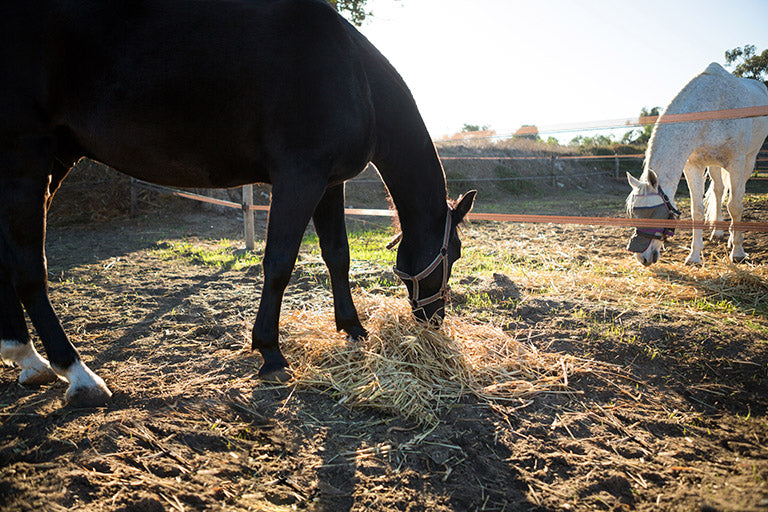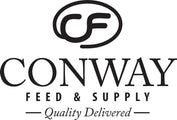We have the lowest delivery fees

Should Horses Have Hay All the Time?
Horses enjoy hay, and when pasture is not available, it provides an excellent feed option for your animals. Grass and legume hay both have good nutritional content to keep your horses at optimal health and body weight. However, what about other types of feed that horses might need like grain or supplements? Hay might not always be enough for horses, but there also needs to be variety in their diets. So, should horses have hay all the time? Let’s find out.

Is Having Hay All the Time Enough?
Horses are used to eating grass in the wild because it meets their nutritional needs. Hay is the closest feed to grass that you can get during the times when pasture is not available. But should you give your horses hay all the time and is it enough? This depends on their dietary needs, which widely vary by horse. Digestive systems of horses are built in such a way that they need food with high fiber content. In this way, hay is the perfect feed. Since it is mostly comprised of grass, it benefits their digestive systems to work the way they should.
Apart from being a solution when the winter months roll in, and pasture is not available, hay also keeps your horses warm because its fiber content generates heat. However, hay is not the solution to all dietary needs of your horses, because it does not have all the nutrients they need. One of the crucial things missing is moisture. Because hay is dried so that it can keep in storage for long, it does not have enough moisture, unlike fresh grasses on pasture. As a result, horses need plenty of water to go along with hay so that they can stay hydrated.
Hay also loses some nutrients in the process of drying and baling. As a result, if hay is the only thing you’re feeding horses, then they might be lacking some of those elements. For instance, hay does not have salt, so you can give your horses salt licks or loose salt in addition to the feed. Also, a vitamin or mineral complex can be an excellent solution to add to the diet.

Feeding Hay All the Time
There is no problem with your horses having hay all the time, year-round. It is beneficial to your horses because it provides proper nutrition and helps the horse’s digestive tract to work properly. Although it should not become the only feed your horses consume, it should become the staple in their diet. Hay of good quality can satisfy the needs of most horses in terms of calories and protein, as well as macro minerals. Hay is usually low in microelements, so these might need to be supplemented additionally.
Many horses can do well on hay alone, but there are also vitamins to consider. The process of drying destroys vitamin E and omega-3 fatty acids found in fresh grasses. Apart from that, storing hay also makes it lose a lot of vitamin A. For this reason, you will need to find a quality vitamin and mineral supplement to support the health of your animals.
What You Can Give to Your Horses Besides Hay
If you do not want to feed your horses with hay all the time, although it is not necessary, you can also replace hay with the following:
- Chopped forage. You can chop and bag forage to keep in the barn for the colder months and use instead of hay for horses.
- Hay cubes or pellets. If loose hay is not available, you can also use cubes or pellets to feed your horses. However, pellets are not as good in replacing hay completely, because longer fibrous stems of the plants are broken to make them.
- Soybean hulls. Replacing hay with soybean hulls is similar to using hay pellets, in a sense that horses will be missing the fiber that comes from long stems in loose hay. Otherwise, soybean hulls meet the nutritional needs of most horses.
- Mixed “complete” feed. If you do not feed hay to your horses at all, the “complete” mix of forage and grains, with added vitamins and minerals, will be a good replacer. It will help you meet their dietary needs, but at the same time, they will still need something else to chew.

Can There Be Too Much Hay?
Horses depend on their routines in many ways. They have good internal clocks and always know when it is time for them to feed. When horse owners choose mealtime feeding, there is a chance that they will not be consistent, which goes against the way the digestive system of horses works. For the majority of horses, the system works, as long as you do not let them go without food for longer than 8 hours a day. But this might not be the case for horses prone to colic.
The best option for you as the owner will be to let your horses decide when they should eat. You can do that by providing your horses with constant access to an abundant amount of hay. When horses are left without feed for long periods of time, it can cause digestive upset and even gastric ulcers and colic. That is why when horses are in the pasture, they graze often.
It is also important to keep in mind the calorie needs of your animals. As the time comes for colder seasons, it becomes harder for horses to achieve their dietary needs and have access to nutritious feed. Hay works best in this regard because it provides nutrition most similar to that of grass. You can give your horses hay all the time during the year and leave it where it is available for them to have all the time. However, keep in mind that hay is still missing some vitamins and minerals that are important for horse health.


Leave a comment